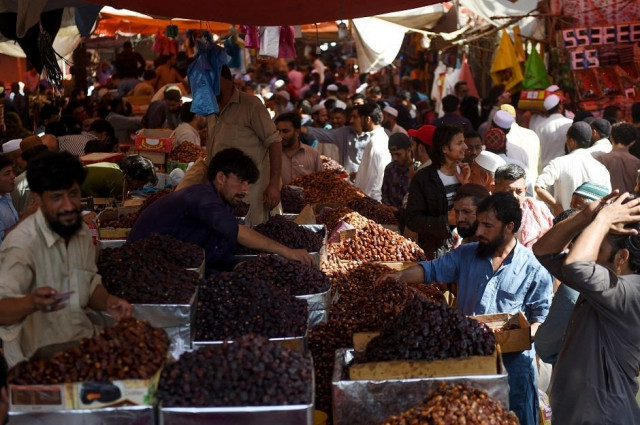Offbeat: A dastarkhwan for everyone
Philanthropists have come forward to help finance and even expand operations in the holy month

Muslims buy dates at a market in preparation for the Muslim fasting month of Ramadan in Karachi, Pakistan. PHOTO: AFP
One such dastarkhwans is being run by the Reality Welfare Organisation in the city’s Gawalmandi area.
It is commonly known by locals as Reality Langar (public kitchen) where more than 200 underprivileged people and commuters are offered a changing, short menu of delicious dishes for iftar.
“It started on the first day of Ramazan in 2017 with joint efforts between philanthropists and Rawalpindi Cantonment Board (RCB)”, the charity’s administration said.
A member of the administration, Muhammad Usman, said that motivation for their work was to provide wholesome meals to poor people who may not be able to otherwise afford good food.
He added that his late father, journalist Asghar Shad, had initiated the activity on a smaller scale at the same spot where the dastarkhwan operates today. Initially, family members continued operating the dastarkhwan, but very soon other philanthropists came forward to help finance and even expand the operation.
“They not only bear all the expenses but are also always looking for ways to improve the experience,” he said.
Usman said the menu rotated and would include options such as chicken, beef, and mutton curries, while fish, seekh kebabs, mutton pulao, and achari chicken are also among the items that are steadily being introduced in the menu.
“We do not offer just a simple iftar — usually a mix of fresh fruits and some samosas and fritters — but a proper Iftar-dinner,” he said.
Talking about how things were being managed, Usman said that most of those who worked to prepare the feast were volunteers.
“Some people offer to cut fruit, others like to prepare beverages, while some lay out the plates, and so on.”
Usman said that the volunteers work only for God’s blessings.
He, however, clarified that the public kitchen is not an annual event in Ramazan. In fact, the langar arranges lunch for unprivileged people during the rest of the year as well.
While there is a smaller, separated enclosure for women and children, Usman noted that most of the people who come here are those with low earnings, including a large number of daily-wage labourers.
He said he wanted to set up a buffet arrangement one day so that he could provide the people with an atmosphere akin to a proper restaurant.
Published in The Express Tribune, June 3rd, 2019.



















COMMENTS
Comments are moderated and generally will be posted if they are on-topic and not abusive.
For more information, please see our Comments FAQ